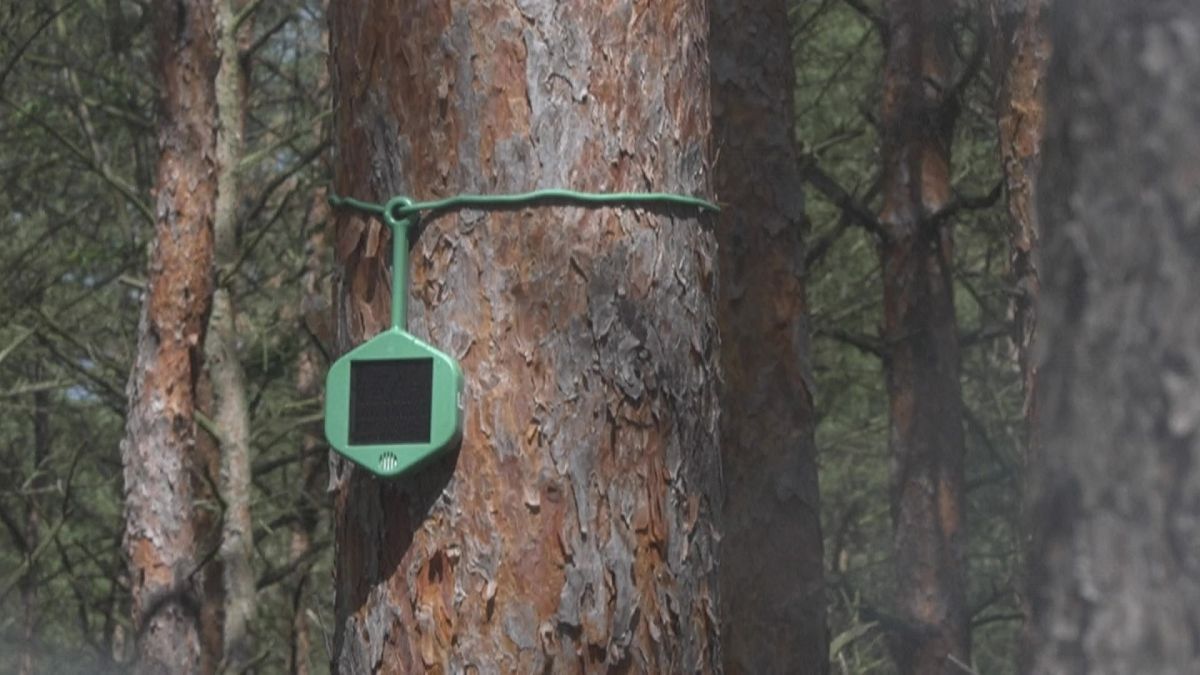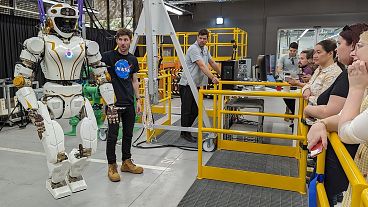The sensors can detect the gases emitted during the earliest, phase of a fire, allowing a more efficient and faster intervention.
Around 400 early-detection sensors have been installed in the Eberswalde forest in Brandenburg, the German region most impacted by wildfires.
The solar-powered sensors are attached to trees and also monitor temperature, humidity and air pressure.
The company behind the technology, Dryad Networks, say that they essentially act like "an electronic nose" and can detect the gases emitted during the earliest phase of a fire, allowing for more efficient and faster intervention.
As soon as a fire is detected, the data gets relayed to a cloud-based monitoring system and fire authorities are alerted.
Dryad Networks uses artificial intelligence to train the sensor which can, for example, tell the difference between a nascent wildfire or the fumes from a passing diesel truck.
"We are here in our laboratory, teaching the sensor to use artificial intelligence for different forest fires: this sensor is the electronic nose. They now sniff out the smell of smoke coming from a pine or beech forest and artificial intelligence maps this pattern, this ecosystem," said Jürgen Müller, co-founder of Dryad Networks.
Müller also teaches the device to distinguish between different types of wildfires, by exposing it to the smoke from a range of wood shavings.
By doing this, the sensor learns "what the smoke from a pine or beech forest smells like," he said.
Müller says that Dryad Networks’ technology is faster than traditional surveillance systems.
"A significant advantage is ultra-early detection. This means that we can detect an emerging fire in just a few minutes, 10 or 15 minutes before there is an open fire. This means we can fight it quickly and thus significantly reduce the damage compared to optical systems," he said.
Brandenburg is testing the reliability of the sensors in a pilot project in addition to a visual detection method currently used in the state.
360-degree rotating cameras scan the surrounding landscape from the tops of 105 towers.
The images are sent to the forest fire centre in Wuensdorf, south of Berlin for close monitoring.
Brandenburg's forest fire protection officer, Raimund Engel says early intervention is key to preventing wildfires from raging out of control.
"The faster we detect the fire, the quicker firefighters can be on the scene," Engel said.
"In recent years, we have been able to significantly reduce the size of the average fire area, because the system of early detection of forest fires means we can detect many of the fires early enough that major damage can be prevented," he added.
About ten countries including the United States, Greece and Spain are already experimenting with the device, according to Dryad Networks.
The company sold around 10,000 of the devices last year and it aims to have 120 million installed worldwide by 2030.
Scientists have warned that increased drought and warmer weather due to climate change will increase the risk of wildfires.
According to the European Forest Fire Information System (EFFIS), more than 119,000 hectares had already been reduced to cinders across the EU by 18 June, well above the average of 80,000 hectares recorded by that time over the 2003-2022 period.
For more on this story, watch the video in the media player above.



